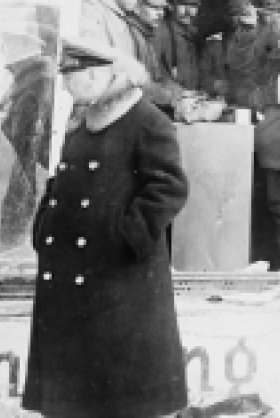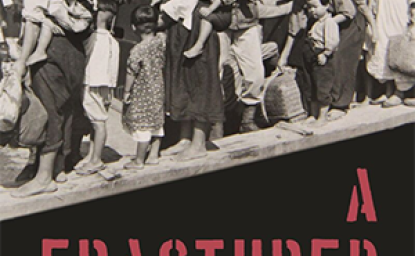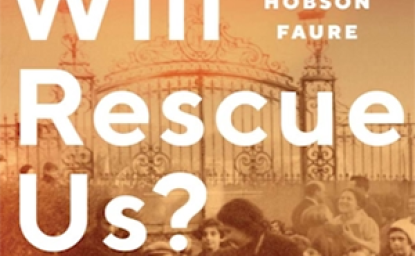"It’s Not the Task of History to Prove Someone’s Ambitions"


Interview with Alexander Okun, Associate Professor, International Relations, Samara State University, upon the completion of his grant, “Russia in American Political Thought and Public Opinion, 1895-1905.” Spring 2013.
Mary Elizabeth Malinkin: What have been some of the most interesting discoveries during your time here?
Alexander Okun: I found a lot of materials, documents, and manuscripts which were new to me which might help me to better understand the problems of Russian and American mutual perceptions. I think the most important things I found were the letters and diaries which provided unofficial views of Americans who lived and worked in Russia — pictures of Russian life through American eyes – these are very important and interesting of course. I had previously worked with official, published materials — travelogues and so on —but not with informal private letters and documents of Americans who lived in Russia for a long time, who tried to understand it and learn Russian. For example, I worked with documents of the first American consul in Vladivostok, Robert Greener, the first African American graduate of Harvard. He tried to translate Pushkin into English, and I have his handwritten translation. I also read the diaries and letters of other American ambassadors and diplomats who worked in Russia such as George Meyer, William Rockhill, and others. It’s not simple to read the handwritten texts, but I try.
What do you think were the most significant factors that resulted in Russia’s image as the “evil twin” of the United States in the early 20th century?
There was a complex of factors. This was a time when different trends met: geopolitical controversies between Russia and America in the Far East and a new alliance between Great Britain and the United States. Russia was Great Britain’s biggest enemy during this period, and in multiple places: the Far East, Middle East, Afghanistan, Iran, Persia, and Tibet. If you became the ally of one side, you became the enemy of the other, not necessarily the enemy, but not friends. During this same period Russia was going through a reactionary process —reforms came to an end, and the regime rejected any proposed liberal reforms. Various groups were oppressed including political dissidents, Jews, and other religious and ethnic minorities. This information came to the American press, and in a short period there was a crucial transformation of the image of Russia from a distant friend to a potential enemy—a dark twin or something like that. Through a combination of geopolitical interests and new information both America and Russia began to have more intensive contact with each other, and America saw Russia as being very different. America saw its opposite in Russia, and its own position played a role in shaping its image of Russia, i.e. “If we are a good empire, the opposite side must be the evil empire.” The same phenomenon happened after the Bolshevik Revolution and the Second World War. Geopolitical ideology formed a negative image of the opposite side. But the beginning of the 20th century was the first time this transformation happened.
How did you choose the dates that you focused on (1895-1905)?
I think the first date is more or less flexible, but in 1894 there was a changing of the emperor in Russia, and there were a lot of hopes for the young and educated Nicolas II, that he would change everything. But after high hopes came major disappointment, and in 1905 there was a revolution in Russia and crucial changes in Russian political and social life, and the Russian-Japanese War, and so all these significant events marked the beginning of a new period in Russia and a new period of Russian-American relations too. Those 10 years were the most important in the transformation.
How was the U.S. getting so much bad news about Russia at that time?
Having read many American newspapers from this period, I can’t say that bad news dominated. There was a lot of news about Russian culture —music, literature, Tolstoy, etc.—and a lot of information about the trans-Siberian railway, and about Siberia as an important part of Russia’s future as well as a promising sphere for American business too, but this kind of news was not on the front page. The front page focused on repression, the exile system, the Jewish question, the Kishinev Pogrom, etc. So there was a huge flow of negative information on the front pages, and that’s a very important way to shape and manipulate public opinion. So, yes, you could read on the 17th page of the New York Times that there was something good happening in Russia, but most people read the front page, not the 17th. I analyzed articles that mentioned Russia in the American press during those years, and there was a considerable increase in negative information. While the newspapers were the major source of information, a lot of Americans were also going to Russia at that time – travelers, politicians, businessmen, globe trotters, journalists, etc. and they wrote memoirs, diaries, and letters to their friends and families. This was another important source. Russian émigrés were a source of information as well and those who came to America during the 1880s tended to be religious and ethnic minorities, political dissidents, members of the opposition, and revolutionaries, bringing a very negative image of the Russian political system and Russian life in general. They were also very active - active in the press and giving lectures, and they enjoyed a lot of support in America. So it was funny because people who were considered criminals and terrorists in Russia were treated as heroes in America. This image of freedom fighters added to the overall negative image of the political system in Russia, and the idea that America should help free Russian people from a despotic regime became very popular in the 90’s and the beginning of the 20th century. George Frost Kennan also contributed to creating an image of Russia—his lectures, writings, articles, books were very popular in America. There were even a few societies working for a “free Russia,” for Russian freedom, etc. and they stirred up propaganda against the Russian regime and collected money for Russian revolutionaries. So there was information being disseminated by various sources, but it was all largely negative.
Was Russia simultaneously portraying the U.S. as an enemy?
No, in Russia, America was popular in many different social circles during this time. Liberals saw in America an example of a free society—an example that Russia should follow. Russian pragmatics-technocrats such as Prince Khilkoff and Witte tried to use American industrial technology and experience to reform Russian industry and the railroads. There was a lot of positive attention on America. Even in the conservative camp there was no negative attitude toward America. I read articles by Konstantin Pobedonostsev, the leader of the Russian conservative movement at that time, in American magazines and newspapers and he tried to explain to America that Russia is good – that Russia is America’s friend. At that point there were not any conflicts – real conflicts – between Russia and America. Anti-Americanism did not appear in Russia until the 1930s or the end of the 1920s at the earliest. Lenin wrote that the Soviet Union must use American experience and ideas for creating new industries, and they did. There were also real ideas of cooperation with America. America played a great role in Russian industrialization in the end of the 20s. A lot of Americans and American technology came — Ford for example — but then America became the geopolitical enemy. Even American anti-Soviet intervention did not affect the relations of the two countries until the end of the 20s. Only in the end of the 20s did America become the enemy in Soviet Russia – the leader of the imperialist world and so on.
How does the image of Russia in American political thought and public opinion of a hundred years ago compare to its image today?
Unfortunately I can say that very few things have changed. You know, there is a real difference between the attitudes of Americans towards Russian people and the Russian political regime. I feel very comfortable here for one. This is the second time I’ve visited America for a long period and I’ve never had any problems. Not only in the academic community, but also in the streets. When people find out I’m from Russia they say “Oh! It’s very interesting.” They want to talk and ask questions. But there is a very different image of Russian power—“such good people and such bad power.” So it’s just like it was 100 years ago. Even the idea that we need to help free the Russian people, to change their awful political system and so on—it’s the same now as it was then. I think more changes have been in the Russian perception of America—it seems more Russians have a very negative image of America: “Oh, those Americans, they try to dominate, they try to control everything, they try to force us, and everybody else, to be little brothers…” and so on. I know this first hand because I work with students, and sometimes I ask them what they think about America. It’s very funny because those students who were in America have a very positive or at least objective view, and those who have never been here–who get all their information from modern Russian propaganda–from television or the press—often have a very negative view. Anti-Americanism is one of the important tools of modern Russian propaganda. It’s a way of manipulation.
What can we learn from the past, from the period you studied? What can we apply to today?
I think the most important thing is that you need to try free yourself of all stereotypes and prejudices. You need to leave the past behind. If you are a prisoner of past ideas you never can do anything new. Second, you need to try to understand each other—to understand why you think the way you do, why you live the way you do, why you like this and don’t like that. You can’t force anybody to love you—it’s impossible. And you don’t need to. You need to appeal to reason—not to feelings or some metaphysical ideas. You need to understand that you can’t live without making any impact on each other, without having any contact, so if you want to cooperate, you need to know each other, to live in one world. These are very simple things but very difficult to do. A lot of Russians go to America with the all the old ideas, prejudices, and stereotypes, and they don’t see things as they are. It’s the same thing with Americans. They still have the image in their minds of Russia as evil, and the myth of the strange, mystical Russian soul. Russians are all very different just like Americans. And the government is never the same as the people – not in America, Russia, nor Europe – not anywhere.
It was funny to hear you, a historian, say that we need to leave the past behind. In any country there’s often a national debate about the history curriculum, what should go into it, etc., and I’m curious how you look at this as a history professor in Russia.
You know, the problem is not history. The problem is the political use of history – it’s very different. And all these debates are not new. We had them last year and 10 years ago. There’s an old Russian joke that Russia has the most unpredictable history. Every new government, every new political leader in Russia tries to rewrite history with their own views, for their own benefit. I think the Russian scholarly and historical communities are strictly against those ideas, but who asks them? There are a lot of people who are trying to make a political career. I don’t think they will be very successful because in 10 years they will need to rewrite history again. I think the most important thing is to depoliticize history and try to study history as it was, with all its controversies, with all its problems, different ideas and so on. But this is a job for historians, not for politicians. So when I say that we need to leave the past behind I mean that we need to leave history to historians. Politicians aren’t interested in academic ideas or problems; they need propaganda tools, and in Russia, history is a traditional tool of government propaganda. This was not a strictly Soviet problem – it was the same in 19th century Russia. And not only in Russia. History is a very important part of national identity and manipulation of public opinion all over the world.
Are government officials affecting what professors and teachers can teach in Russia?
I can’t imagine how it would be possible for someone to tell me that I need to say “this” and I can’t say “that.” I can’t imagine it. But with all of the talk about reducing the education system, I think a lot of Russian teachers and professors fear they will be laid off so maybe they will try to be very loyal to keep their positions. Maybe. That’s another negative Russian and Soviet tradition: loyalty is the price you pay for your career. But it’s hard for me to answer while over here in America, but when I go back I’ll be able to understand it better. I don’t think it will be very serious though. It isn’t the first time they’ve said we need one textbook, one history that we can be proud of. It’s absolutely crazy because we have the history that we have. We can’t have another history. It already happened. There are pages of pride and pages of shame – just like in any other country. But the political use of history is detrimental not only to history or historiography in Russia, but also to the Russian people, to the future of Russia, and to the national identity. This idea that we are great, we are brilliant, we are the best in everything, etc. is not good. It’s not the task of history to prove someone’s ambitions.
Mary Elizabeth Malinkin
Matthew Rojansky, Director, Kennan Institute
Authors

Kennan Institute

Associate Professor, International Relations, Samara State University

Kennan Institute
After more than 50 years as a vital part of the Wilson Center legacy, the Kennan Institute has become an independent think tank. You can find the current website for the Kennan Institute at kennaninstitute.org. Please look for future announcements about partnership activities between the Wilson Center and the Kennan Institute at Wilson Center Press Room. The Kennan Institute is the premier US center for advanced research on Eurasia and the oldest and largest regional program at the Woodrow Wilson International Center for Scholars. The Kennan Institute is committed to improving American understanding of Russia, Ukraine, Central Asia, the South Caucasus, and the surrounding region through research and exchange. Read more




